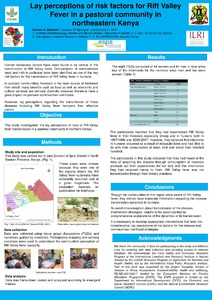Resource information
Consumption of contaminated livestock products is one of the risk factors for the transmission of Rift Valley fever (RVF) in humans. In pastoral communities, livestock is the main source of livelihood providing nutritional, economic and cultural services hence zoonotic diseases tend to be more prevalent in such communities. An understanding of the lay perceptions regarding the transmission of zoonoses can help institute effective interventions. A qualitative study was carried out in Ijara district in Kenya to investigate the lay perceptions of RVF transmission. Data was transcribed, coded and analysed according to emergent themes. Participants indicated that RVF infections in humans occurred as a result of mosquito bites and had little to do with consumption of livestock products from infected livestock. Despite having heard about the risks of acquiring RVF through consumption of livestock products, their experiences did not tally with this information hence to them, RVF was not transmissible through their dietary practices. The community in this region was aware of RVF, but did not have elaborate information regarding its transmission dynamics. It is necessary to develop appropriate interventions that include comprehensive explanations of the dynamics of RVF transmission and also takes into consideration communities' livelihood strategies.



